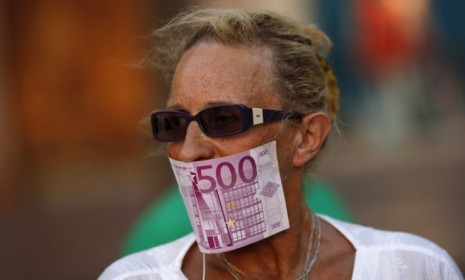Spain's bank bailout: Just kicking the crisis down the road?
Europe agrees to provide Spain's crippled banks with $125 billion in aid, averting a collapse of the euro currency bloc — for now

This weekend, European leaders agreed to extend 100 billion euros ($125 billion) in aid to Spain's banks, the latest in a string of emergency bailouts intended to contain the continent's long-simmering debt crisis. Spain's troubled banking industry — which is rotted with bad loans from a housing boom and bust — has weighed heavily on the country's ability to sell bonds, pushing its borrowing costs to dangerously unaffordable levels. Without the bank rescue, Spain would likely have needed a super-sized bailout for the entire country, a development that would have emptied Europe's coffers and possibly caused the collapse of the euro currency. But while investors are breathing a sigh of relief after this bank bailout, others are concerned it didn't go far enough. Is Europe just kicking the can down the road?
The Spanish bailout is just a stopgap measure: This won't contain the euro crisis — it only "marks a new phase," says Britain's The Guardian in an editorial. Spain's bailout "merely invites shell-shocked financiers and wary business people to speculate on which other nations will land up in the euro sick bay." Until the eurozone's leaders agree to deeper fiscal integration, in which Europe issues joint bonds and works under a common banking union, the debt crisis won't be put to rest.
"Spain and the euro crisis: when 100 bn doesn't fix much"
The Week
Escape your echo chamber. Get the facts behind the news, plus analysis from multiple perspectives.

Sign up for The Week's Free Newsletters
From our morning news briefing to a weekly Good News Newsletter, get the best of The Week delivered directly to your inbox.
From our morning news briefing to a weekly Good News Newsletter, get the best of The Week delivered directly to your inbox.
And it won't repair Spain's ruined economy: Spain's banks "did indeed need a bailout," but the country's devastated economy is also in desperate need of assistance, says Paul Krugman at The New York Times. Spanish and European leaders are "signaling strongly that they have no intention of changing" the harsh austerity policies "that have left almost a quarter of Spain's workers — and more than half of its young people — jobless." Spain and Europe seem to be "entering a new recession," which will only hurt the continent's finances down the road. Europe needs to take concerted action to boost economic growth, not just avert immediate disaster.
Actually, the bailout could hasten the euro's demise: Spain received this aid without any of the strict budgetary conditions that accompanied past bailouts to Greece, Ireland, and Portugal, says Nicholas Hastings at The Wall Street Journal. "Ireland has already expressed its displeasure," and is now demanding that it retroactively receive a similar deal. Meanwhile, Greece is set to go to the polls this week, and anti-austerity parties could use "the Spanish deal as justification as to why Greece" should refuse the austerity conditions of its bailout. That could lead to a Greek exit from the euro, which may spell the end of the currency bloc.
"Spanish people may yet regret this bailout"
A free daily email with the biggest news stories of the day – and the best features from TheWeek.com
-
 Grok in the crosshairs as EU launches deepfake porn probe
Grok in the crosshairs as EU launches deepfake porn probeIN THE SPOTLIGHT The European Union has officially begun investigating Elon Musk’s proprietary AI, as regulators zero in on Grok’s porn problem and its impact continent-wide
-
 ‘But being a “hot” country does not make you a good country’
‘But being a “hot” country does not make you a good country’Instant Opinion Opinion, comment and editorials of the day
-
 Why have homicide rates reportedly plummeted in the last year?
Why have homicide rates reportedly plummeted in the last year?Today’s Big Question There could be more to the issue than politics